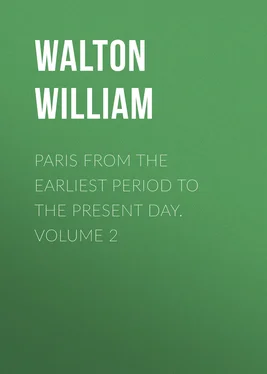William Walton - Paris from the Earliest Period to the Present Day. Volume 2
Здесь есть возможность читать онлайн «William Walton - Paris from the Earliest Period to the Present Day. Volume 2» — ознакомительный отрывок электронной книги совершенно бесплатно, а после прочтения отрывка купить полную версию. В некоторых случаях можно слушать аудио, скачать через торрент в формате fb2 и присутствует краткое содержание. Жанр: Путешествия и география, История, foreign_edu, foreign_antique, foreign_prose, на английском языке. Описание произведения, (предисловие) а так же отзывы посетителей доступны на портале библиотеки ЛибКат.
- Название:Paris from the Earliest Period to the Present Day. Volume 2
- Автор:
- Жанр:
- Год:неизвестен
- ISBN:нет данных
- Рейтинг книги:3 / 5. Голосов: 1
-
Избранное:Добавить в избранное
- Отзывы:
-
Ваша оценка:
- 60
- 1
- 2
- 3
- 4
- 5
Paris from the Earliest Period to the Present Day. Volume 2: краткое содержание, описание и аннотация
Предлагаем к чтению аннотацию, описание, краткое содержание или предисловие (зависит от того, что написал сам автор книги «Paris from the Earliest Period to the Present Day. Volume 2»). Если вы не нашли необходимую информацию о книге — напишите в комментариях, мы постараемся отыскать её.
Paris from the Earliest Period to the Present Day. Volume 2 — читать онлайн ознакомительный отрывок
Ниже представлен текст книги, разбитый по страницам. Система сохранения места последней прочитанной страницы, позволяет с удобством читать онлайн бесплатно книгу «Paris from the Earliest Period to the Present Day. Volume 2», без необходимости каждый раз заново искать на чём Вы остановились. Поставьте закладку, и сможете в любой момент перейти на страницу, на которой закончили чтение.
Интервал:
Закладка:
The members of the Parlement returned from their exile as contumacious as ever. Against the express command of the king, they persisted in occupying themselves with religious questions and manifesting a spirit of opposition to the pretensions of the Papacy. The public excitement was so great that a wretch named Damiens attempted to assassinate the king, in 1757, but only wounded him slightly. In 1770, the Duc d'Aiguillon, Governor of Brittany, having been relieved of his post and formally accused by the parlement of that province, was brought to trial before the Parlement of Paris in his quality of peer of the realm. He was about to be condemned when the king, in a bed of justice, quashed the proceedings. To the indignant protests of the magistrates, who suspended their sittings, Louis XV replied by dismissing his minister, Choiseul, and giving his post to D'Aiguillon. On the night of the 19th and 20th of January, 1771, a hundred and sixty-nine of the members of the Parlement were each awakened by two musketeers, who required them to sign yes or no on the order to resume their official functions. Thirty-eight signed yes , but retracted this consent two days later; on the following night a huissier notified the members of their suspension from office, and the musketeers brought them lettres de cachet which banished them all in different directions. At the end of the year there were more than seven hundred magistrates in exile. The king transformed his council into a parlement, under the presidency of M. Maupeou, from whom it took its name, but it was received with a storm of popular insult and ridicule. Public opinion throughout the nation was aroused; all the princes of the blood, excepting one, and thirteen peers protested to the king "against the reversal of the laws of the State," and the name of the États Généraux was openly pronounced in the parlements of Toulouse, Besançon, Rouen, and even in Paris. "Richelieu and Louis XIV had destroyed the political importance of the nobility; Louis XV destroyed the great institution of the magistracy,—what was there remaining to prop up the ancient edifice and to cover the monarchy?"
The ribald Parisians circulated this Pater , and found amusement in it: "Our Father who art at Versailles, your name be glorified, your reign is shaken, your will is executed no more on the earth than in heaven; give us our daily bread, which you have taken from us; pardon your parlements, which have sustained your interests, as you pardon your ministers who have sold them: do not succumb any longer to the temptations of the Du Barry, but deliver us from the devil of the chancellor."
In the midst of the general decadence, which affected alike royalty, the clergy, and the nobles, in the general confusion and inequality of all laws and procedure, a formidable spirit of investigation began to stir. The nation had no written constitution, everything depended upon custom, and was maintained only by a sort of public opinion, which constantly varied. The contradictions and anomalies in all branches of the public administration were rendered even more hopeless by the general corruption and clashing of individual interests: "France has no general, positive, written law … which defines all the powers," said Lally Tollendal in the chambre de la noblesse in 1789. Both the civil and the penal law bristled with the most flagrant injustice, the accused was frequently allowed no defence; torture, mutilations, and the death-penalty were awarded with the most shocking facility and for the most inadequate crimes,—the complete innocence of the victim was but too frequently recognized after his execution. "If I were accused of having stolen the towers of Notre-Dame," said one, "I would consider it prudent to run away." The right of asylum was still maintained in Paris in the enclosure of the Temple, as in the Middle Ages; in 1768, "poor devils were sent to the galleys for having sold certain books, among them the innocent satire of Voltaire: L'homme aux quarante écus ."
The details of the trial and execution of Damiens, for his attempt on the life of the king, give a better picture of the times than any general description. Immediately after his arrest, his legs were torn with red-hot pinchers, and these wounds were not allowed to heal. He was confined in the Tour de Montgommery, in a circular chamber twelve feet in diameter, almost without light and air, strapped down, without the power of movement, to a mattress, the bottom of which was alternately pushed up and let down by a jack underneath. His examination lasted fifty-seven days; he was put to the question, "ordinary and extraordinary," to discover the names of his accomplices, and finally condemned to death by torture in very nearly the same phrases as those which we have quoted in the sentence of Ravaillac. An enclosure was arranged in the Place de Grève, surrounded by a strong barricade of planks, pointed at the top, with elongations at the four corners for the four horses who were to écarteler the criminal; in the centre was a very solid wooden table, six feet long, four feet wide, and about three feet high, on which he was to be placed, fastened down with iron plates over his chest, stomach, and between his thighs, in such a manner that his body should be perfectly immovable while his limbs were at liberty. "The roofs of all the houses in the Grève," says the contemporary Journal de Barbier , "and even the chimneys, were covered with people. There was a man and a woman who fell in a certain locality, and who injured others. It was remarked that there were very many women, and even some of distinction, and that they sustained the horror of this execution better than the men, which did not do them any honor."
From the memoirs of H. Sanson, one of the public executioners, the following details are quoted by M. de Genouillac. "The tortionnaire , who had charge of the pinchers, and who, by a singular mockery of circumstances, bore the name of a great seigneur of the time, Soubise, had assured his chief that he had procured all the implements indicated in the sentence. When he arrived at the scaffold, Gabriel Sanson immediately perceived that the miserable Soubise was drunk, and quite incapable of fulfilling his appointed task. Filled with violent apprehension, he demanded to be shown the lead, the sulphur, the wax, and the rosin which Soubise was to have purchased; everything was lacking, and it was recognized at the same moment that the 'patient' might arrive immediately, that the pile which was to consume his body was composed of damp and ill-chosen wood that would be very difficult to light.
"In contemplating the consequences of the drunkenness of the tortionnaire , Gabriel Sanson lost his head. For some moments the scaffold presented a spectacle of inexpressible confusion; the valets ran about distracted, everybody cried out at once, and the unhappy executioner of the prévôté de l'hôtel tore his hair while deploring the terrible responsibility which he had brought down upon his head. The arrival of the lieutenant of the short robe, who had finished disposing his men in the enclosure, the presence of the procureur général, who had been sent for, put an end to this disorder.
"The magistrate severely reprimanded Gabriel Sanson.... During this interval, the valets went into the shops of the grocers of the neighborhood to provide themselves with what was necessary; but when they issued from the enclosure, the crowd followed them,—in all the shops which they entered their purpose was made known and the merchants refused to sell them, or pretended not to have what they desired; it was necessary for the lieutenant to send with them an officer to demand, in the king's name , the objects of which they had need."
"This scene was prolonged for such a length of time," says M. de Genouillac, continuing the narration, "that everything was not yet ready when the patient arrived on the Place de Grève, and they were obliged to seat him on one of the steps of the scaffold whilst they proceeded, under his very eyes, with the final preparations for his death. Damiens had remained three hours in the chapel; he had prayed continually, with a fervor and a contrition that had touched the hearts of all those present. When four o'clock struck from the clock of the Palais, Gabriel Sanson approached MM. Gueret and De Marsilly, and said to them that the hour to set out had arrived.
Читать дальшеИнтервал:
Закладка:
Похожие книги на «Paris from the Earliest Period to the Present Day. Volume 2»
Представляем Вашему вниманию похожие книги на «Paris from the Earliest Period to the Present Day. Volume 2» списком для выбора. Мы отобрали схожую по названию и смыслу литературу в надежде предоставить читателям больше вариантов отыскать новые, интересные, ещё непрочитанные произведения.
Обсуждение, отзывы о книге «Paris from the Earliest Period to the Present Day. Volume 2» и просто собственные мнения читателей. Оставьте ваши комментарии, напишите, что Вы думаете о произведении, его смысле или главных героях. Укажите что конкретно понравилось, а что нет, и почему Вы так считаете.












